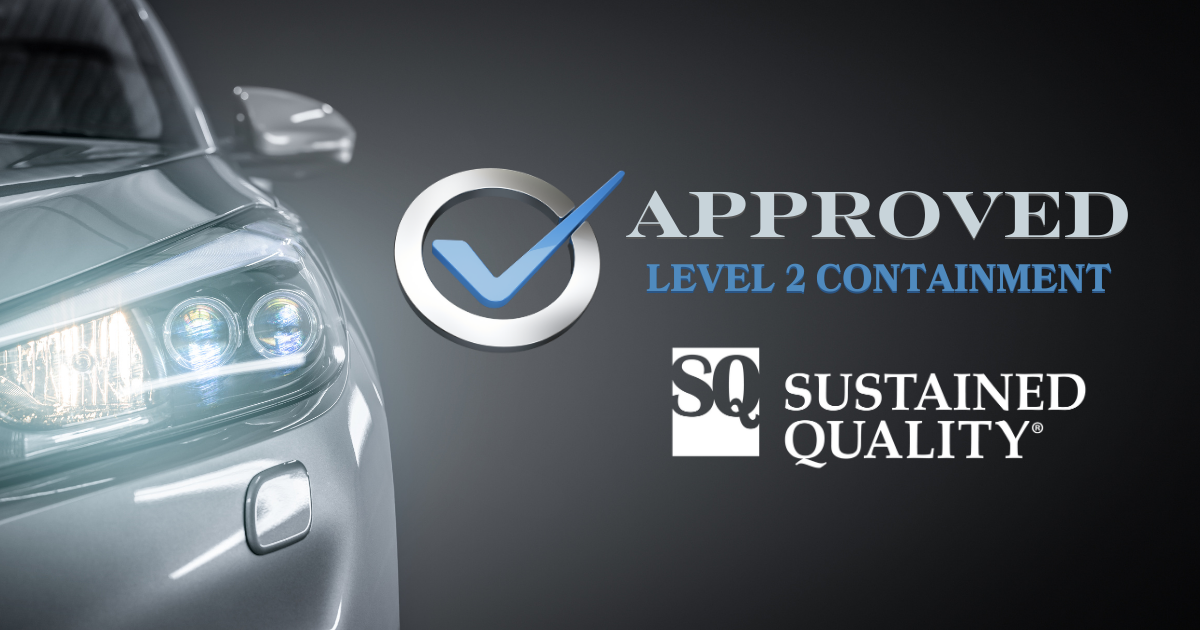What is CS1 and CS2 Level 2 Containment?
December 19, 2024
In automotive manufacturing, quality assurance is critical for success. Even minor defects can have major repercussions, impacting both safety and brand reputation. To maintain the highest standards of quality, manufacturers rely on containment protocols to catch and address issues before they escalate.
Let’s dive into what containment levels mean, why level 2 is critical, and how CS2 inspections ensure corrective actions are effective.
Understanding Containment Levels
In manufacturing, containment is a quality management practice designed to detect, isolate, and address non-conformance issues before they impact production or end users. These processes are categorized into levels based on their scope and oversight:
Level 1 Containment: Handled internally by the supplier, this level focuses on identifying and resolving issues at the source, ensuring non-conforming products don’t reach the customer.
Level 2 Containment: Managed by an approved third party, level 2 containment adds an extra layer of assurance. It involves a rigorous review process, often required when higher levels of accountability or complex problem-solving are needed.
By adhering to these structured processes, automakers can ensure their production lines remain efficient and defect-free.
The Importance of Level 2 Containment
Level 2 containment is more than a safety net; it can double as a strategy to address quality issues with a fresh perspective. It plays a critical role in:
Building Customer Confidence: Automakers rely on third-party oversight to confirm that issues are effectively addressed.
Minimizing Disruptions: By isolating and addressing problems early, production delays are minimized.
Ensuring Compliance: Level 2 containment demonstrates adherence to stringent quality standards, a vital requirement for maintaining trust and contracts with OEMs.
Controlled Shipping Level 1 (CS1)
CS1 is typically an internal process managed by the supplier under the automaker’s supervision. It represents the first level of escalation when quality issues are detected, requiring the supplier to take immediate action to contain and address the problem while maintaining normal production and delivery timelines.
Controlled Shipping Level 2 (CS2)
CS2 is a widely recognized containment process in the automotive industry, designed to enforce stricter oversight when quality issues arise. While the term is used broadly to refer to additional inspections and corrective actions mandated by a customer, General Motors has a specific interpretation of CS2 within their quality framework.
For GM, CS2 includes not only heightened scrutiny but also a structured methodology to ensure long-term issue resolution. This tailored approach highlights how CS2 can vary in application, depending on the manufacturer’s unique requirements.
For our purposes, we are using the term more broadly. This elevated process introduces stricter controls and independent oversight to ensure non-conformance problems are swiftly identified, effectively corrected, and prevented from recurring. CS2 is a critical tool in protecting the integrity of the production line and maintaining the trust of end customers.
Escalation from Level 1
CS2 is not the starting point for addressing quality concerns; it represents an escalation when CS1 measures prove insufficient. For example, if brake pad assemblies repeatedly fail dimensional checks during CS1 inspections, or if inconsistencies in plastic injection-molded door panel clips persist, a manufacturer may move to CS2. This escalation signifies that a higher level of scrutiny and intervention is essential to restore confidence in the supplier’s ability to meet exacting standards.
Independent Oversight
One of the defining characteristics of CS2 is the involvement of an independent, third-party quality service provider. These experts, often certified in automotive quality standards such as IATF 16949, manage containment processes impartially, ensuring unbiased assessments of supplier performance. For instance, if an issue arises with suspension components like control arms, a third-party quality partner can implement thorough inspection protocols to guarantee that only defect-free parts reach the assembly line. This impartial approach strengthens the trust between the supplier and the original equipment manufacturer (OEM), fostering greater collaboration.
Core Activities in CS2
The CS2 process involves several critical activities aimed at addressing and resolving quality issues:
- Inspection of Suspect Parts: All potentially defective parts, such as wiring harnesses or fuel injectors, are isolated and subjected to comprehensive inspections to confirm adherence to the automaker’s stringent quality standards.
- Root Cause Analysis: Working closely with suppliers, CS2 teams identify the underlying causes of defects—whether due to supplier-side process variation or material quality discrepancies. For example, if steering column components fail torque requirements, a deeper investigation might reveal tooling wear as the root cause.
- Implementation of Interim Controls: Temporary safeguards are put in place to ensure defective parts are kept out of production while long-term solutions are developed. This might involve implementing additional inspection checkpoints before certain parts leave the supplier’s facility.
- Verification of Corrective Actions: CS2 teams monitor and validate the effectiveness of corrective measures over time, ensuring that improvements remain consistent and sustainable.
Benefits for the Customer
In addition to addressing immediate quality issues, CS2 serves as a comprehensive quality assurance mechanism. By holding suppliers accountable to these rigorous standards, manufacturers can protect their production lines, safeguard their reputation, and uphold customer satisfaction.
Moreover, CS2 allows automakers to focus on production continuity and meet delivery schedules without compromising quality. This process supports the overarching goal of maintaining a competitive edge in the market while preventing costly recalls or reputational damage.
Why Choose Sustained Quality?
When you partner with Sustained Quality, you’re choosing a team that understands the stakes and delivers results. Level 2 containment is an essential safeguard for automotive manufacturers, and Sustained Quality is here to support your operations with expertise and dedication. We offer:
- Nissan SSC vendor since 2009.
- General Motors CS2 vendor since 2012.
- A track record of excellence in containment services.
- Customized solutions tailored to the unique challenges of each customer.
- A commitment to continuous improvement and innovation.
